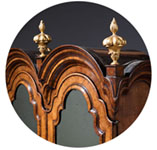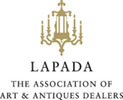Small Proportioned Elegant Portico Mantel Clock by Janvier, c. 1815
Sold
Request Information
Follow Us
Small Proportioned Elegant Portico Mantel Clock by Janvier, c. 1815
Antide Janvier (1751-1835) started his clockmaker’s life in Besançon, a clockmaker’s centre in eastern France, and ended up in Paris in 1784, where he grew to fame. He was the clockmaker of the king’s brother and was particularly interested in planetary clocks (there is one in the Museum of the History of Science, Oxford). He produced exquisite clocks which were widely purchased in France and abroad. However, he also produced more simple and elegant clocks which this is an example of.
The lovely four baluster pillar gilt-brass case has a cylindrical top to house the movement. It is surmounted on the corners by four vase-shaped finials, the top bearing a larger similarly shaped finial on a shaped base. The case rests on four gilt brass bun feet.
The circular 8cm enamel dial has a fine chapter ring with Roman hour numerals, red Arabic quarter-hour, five-minute and minute divisions. The time is indicated by a fine pair of blued-steel fleur-de-lys hands.
The extremely finely made spring-driven eight-day movement has a going train only, which has anchor escapement with the original short silk-suspended pendulum. It also has stopwork.
Condition
Good. Wear consistent with age and use.
Dimensions
Height: 9.06 in. (23 cm)
Width: 4.73 in. (12 cm)
Depth: 2.76 in. (7 cm)
Literature
Tardy, Dictionnaire des Horlogers Français, Paris, 1971, pp. 323-24
J.-D. Augarde, Les Ouvriers du Temps, Antiquorum, 1996, pp. 336.
PREVIOUSLY SOLD
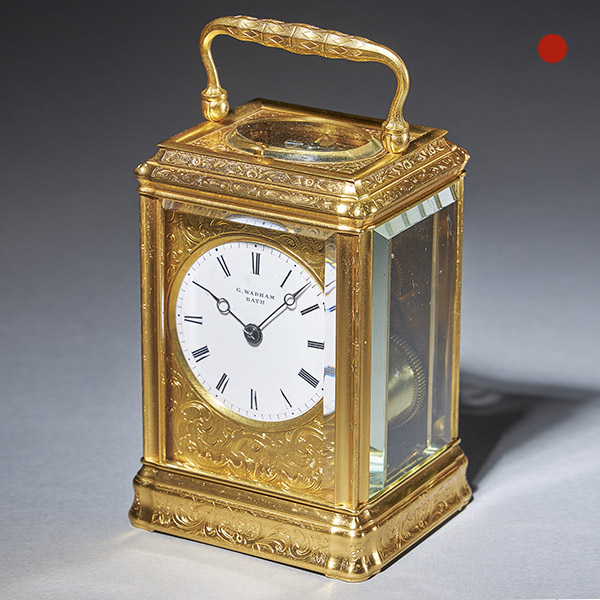
19th Century Gilt-Brass Engraved Striking and Repeating Carriage Clock
19th Century Gilt-Brass Engraved Striking and Repeating Carriage Clock Sold Follow Us19th Century Gilt-Brass Engraved Striking and Repeating Carriage Clock The superb engraved gilt brass gorge case has facetted glass panels to all sides so...
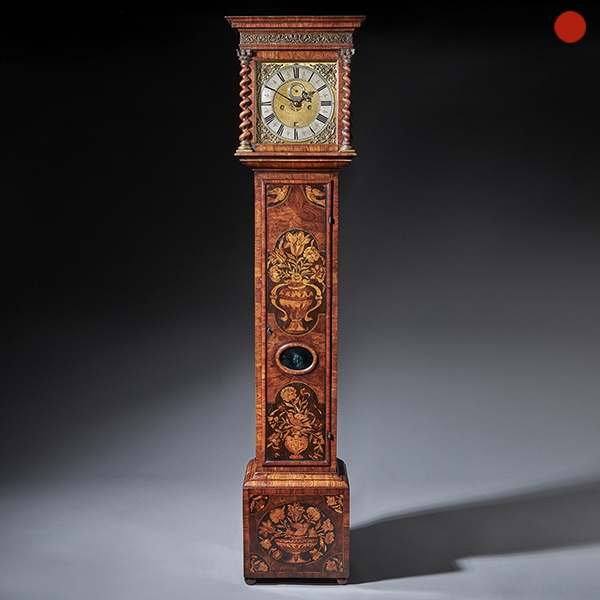
Important Charles II 17th Century Princes Wood and Marquetry Longcase Clock
Important Charles II 17th Century Princes Wood and Marquetry Longcase Clock SOLD Follow UsImportant Charles II 17th Century Princes Wood and Marquetry Longcase Clock A unique and important Charles II 17th century month-going Princes wood and...
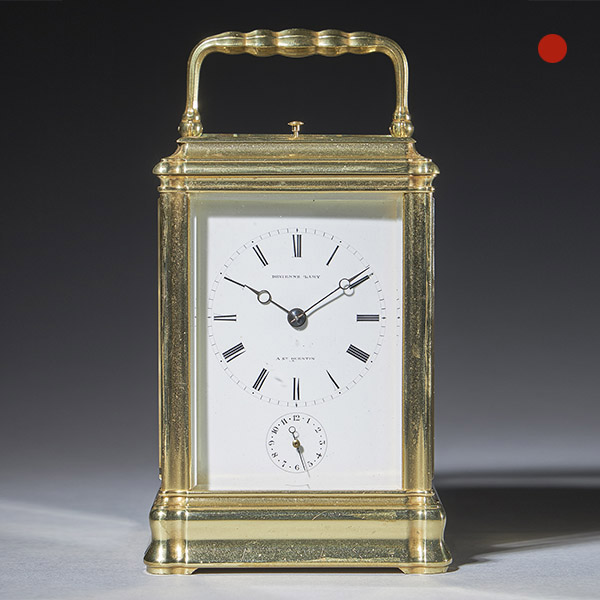
A Rare And Unusual 19th-Century Carriage Clock Signed Devienne Lamy A St Quentin, Circa: 1860
A Rare And Unusual 19th-Century Carriage Clock Signed Devienne Lamy A St Quentin, circa 1860. The gorge case has bevelled glass panels on all sides.
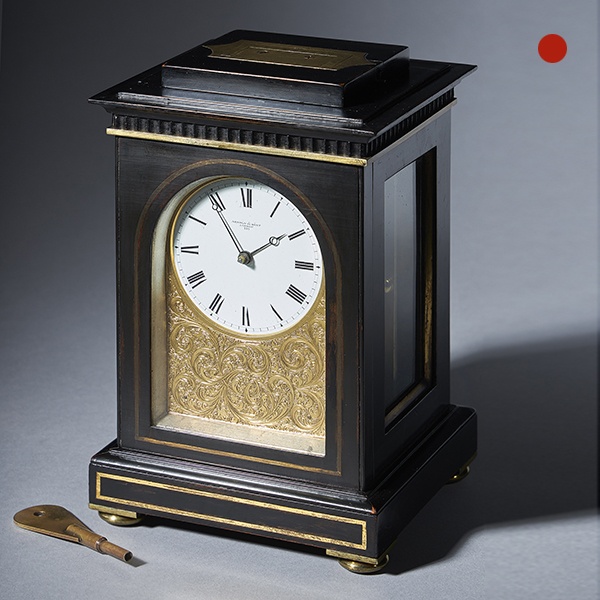
A Unique And Fine Mid 19th-Century Travelling Clock By Celebrated Makers Arnold & Dent, London
Unique and Fine Mid 19th-Century Travelling Clock By Celebrated Makers Arnold & Dent, London. The time is indicated by a fine pair of blued-steel Breguet hands.
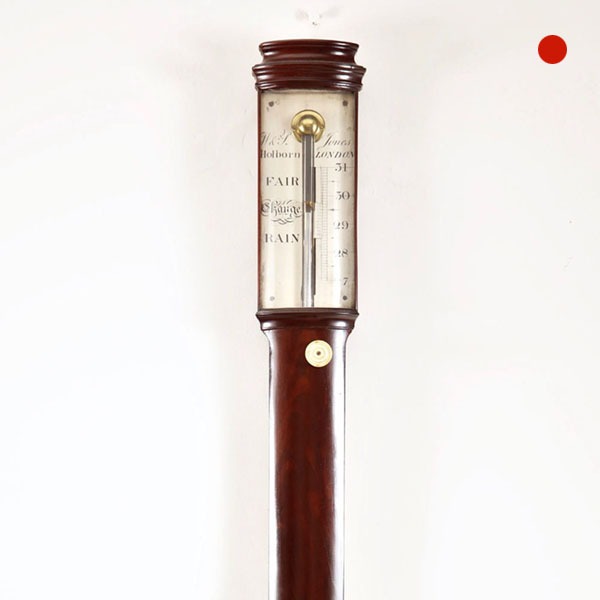
A fine 18th-Century George III mahogany bow-front stick barometer
The mahogany-veneered case has an austere form with only the moulded caddy top and the urn-shaped cistern cover to break its soberness. The silvered register plates are protected by a bowed glass, the recorder with vernier scale being operated by a knob below the register plate.
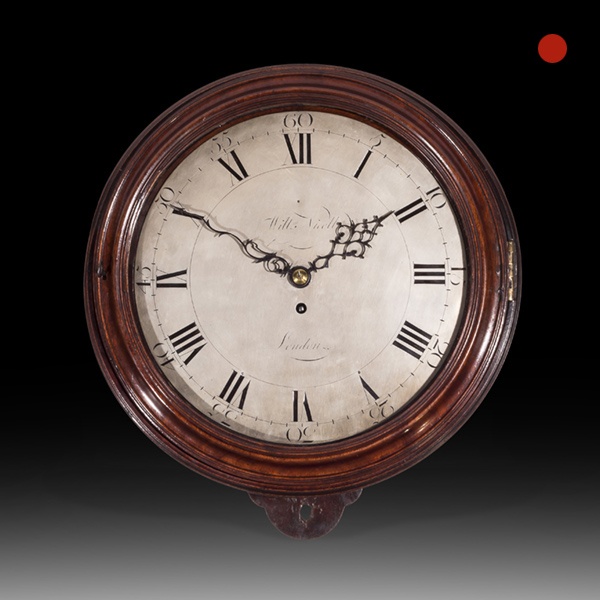
Large Mahogany 18th-Century Dial Clock, William Nicoll, London
The solid mahogany case has a moulded mahogany glazed door, which can be locked on the left-hand side. The original rectangular saltbox is permanently attached to the front and has doors to the side and the bottom.

19th Century Gilt-Brass Engraved Striking and Repeating Carriage Clock
19th Century Gilt-Brass Engraved Striking and Repeating Carriage Clock Sold Follow Us19th Century Gilt-Brass Engraved Striking and Repeating Carriage Clock The superb engraved gilt brass gorge case has facetted glass panels to all sides so...

Important Charles II 17th Century Princes Wood and Marquetry Longcase Clock
Important Charles II 17th Century Princes Wood and Marquetry Longcase Clock SOLD Follow UsImportant Charles II 17th Century Princes Wood and Marquetry Longcase Clock A unique and important Charles II 17th century month-going Princes wood and...

A Rare And Unusual 19th-Century Carriage Clock Signed Devienne Lamy A St Quentin, Circa: 1860
A Rare And Unusual 19th-Century Carriage Clock Signed Devienne Lamy A St Quentin, circa 1860. The gorge case has bevelled glass panels on all sides.

A Unique And Fine Mid 19th-Century Travelling Clock By Celebrated Makers Arnold & Dent, London
Unique and Fine Mid 19th-Century Travelling Clock By Celebrated Makers Arnold & Dent, London. The time is indicated by a fine pair of blued-steel Breguet hands.

A fine 18th-Century George III mahogany bow-front stick barometer
The mahogany-veneered case has an austere form with only the moulded caddy top and the urn-shaped cistern cover to break its soberness. The silvered register plates are protected by a bowed glass, the recorder with vernier scale being operated by a knob below the register plate.

Large Mahogany 18th-Century Dial Clock, William Nicoll, London
The solid mahogany case has a moulded mahogany glazed door, which can be locked on the left-hand side. The original rectangular saltbox is permanently attached to the front and has doors to the side and the bottom.
YOU MAY ALSO LIKE
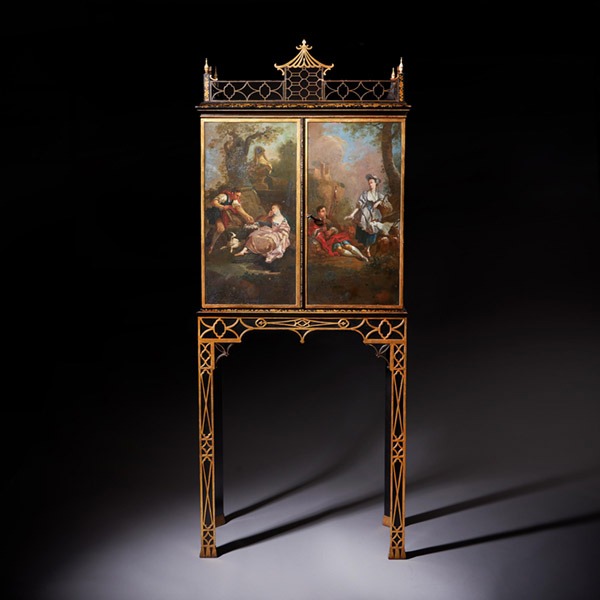
A Rare Chinese Chippendale George III cabinet on stand, circa 1760 England
A Rare Chinese Chippendale George III cabinet on stand, circa 1760. England £38,000Follow UsA Rare...
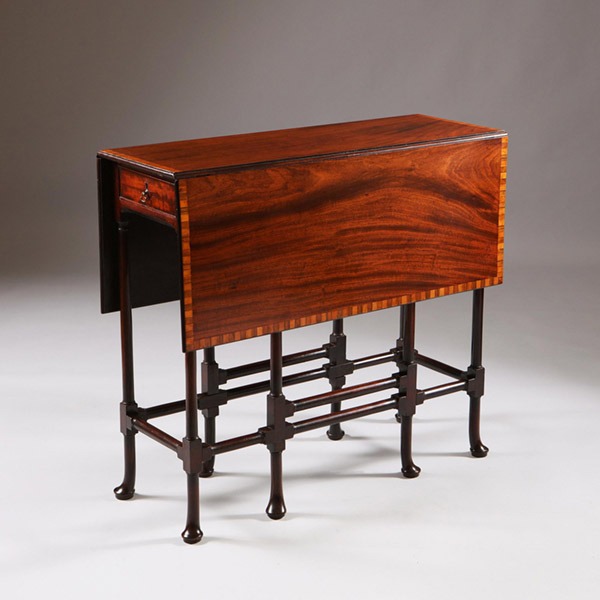
George III mahogany spider-leg table attributed to Thomas Chippendale 1768
A George III mahogany spider-leg table attributed to Thomas Chippendale 1768 £12,000Follow UsA...
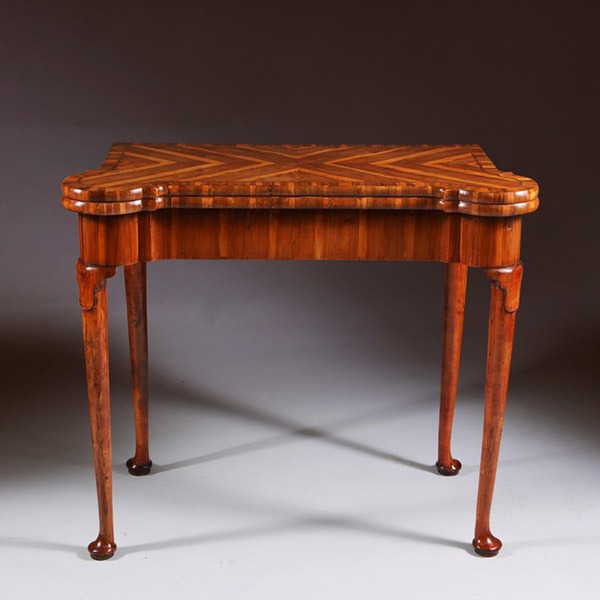
Museum Grade George I Cocus Wood Card Table, Circa 1725, England
Museum Grade George I Cocus Wood Card Table, Circa 1725. England £32,000Follow UsMuseum Grade...
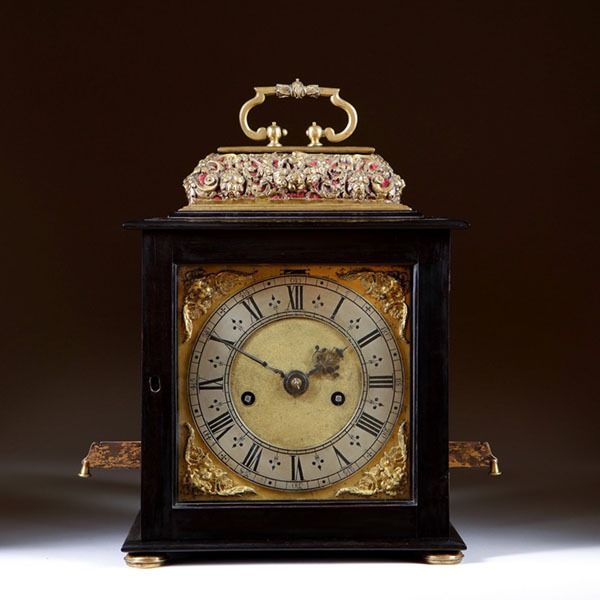
A Rare and Important Charles II 17th Century Table Clock by Henry Jones
A Rare and Important Charles II 17th Century Table Clock by Henry Jones £85,000Follow UsA Rare and...
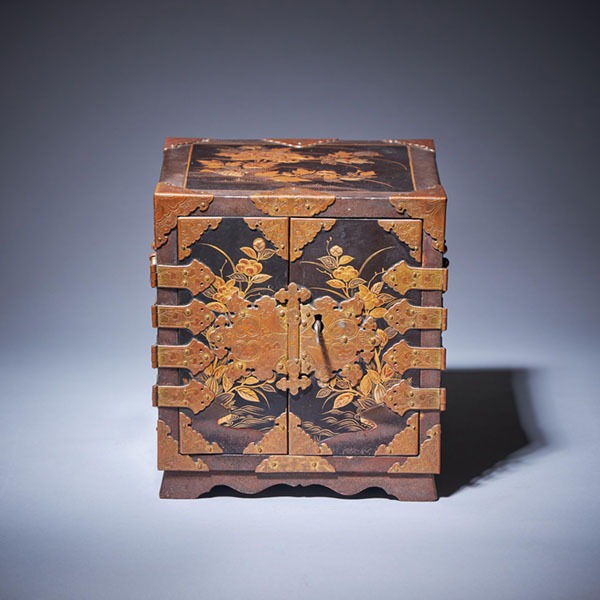
Important Early Edo Period 17th Century Miniature Japanese Lacquer Cabinet
Important Early Edo Period 17th Century Miniature Japanese Lacquer Cabinet £36,000Follow...
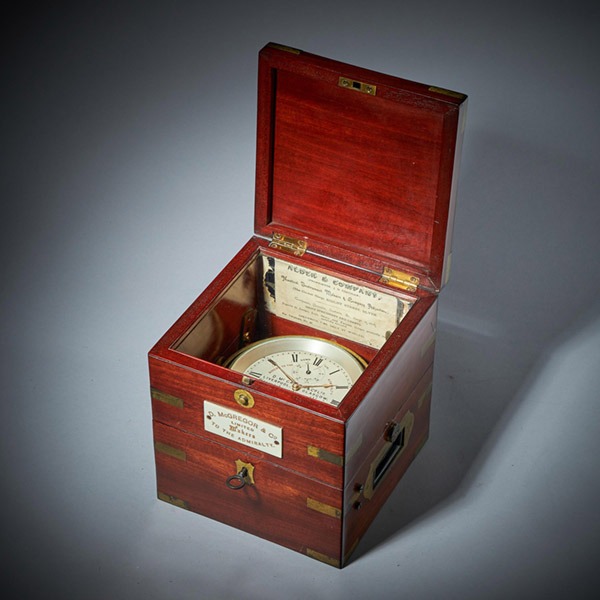
Fine Scottish Two-Day Marine Chronometer Signed and Numbered D. McGregor
Fine Scottish Two-Day Marine Chronometer Signed and Numbered D. McGregor £6,500Follow UsFine...

A Rare Chinese Chippendale George III cabinet on stand, circa 1760 England
A Rare Chinese Chippendale George III cabinet on stand, circa 1760. England £38,000Follow UsA Rare...

George III mahogany spider-leg table attributed to Thomas Chippendale 1768
A George III mahogany spider-leg table attributed to Thomas Chippendale 1768 £12,000Follow UsA...

Museum Grade George I Cocus Wood Card Table, Circa 1725, England
Museum Grade George I Cocus Wood Card Table, Circa 1725. England £32,000Follow UsMuseum Grade...

A Rare and Important Charles II 17th Century Table Clock by Henry Jones
A Rare and Important Charles II 17th Century Table Clock by Henry Jones £85,000Follow UsA Rare and...

Important Early Edo Period 17th Century Miniature Japanese Lacquer Cabinet
Important Early Edo Period 17th Century Miniature Japanese Lacquer Cabinet £36,000Follow...

Fine Scottish Two-Day Marine Chronometer Signed and Numbered D. McGregor
Fine Scottish Two-Day Marine Chronometer Signed and Numbered D. McGregor £6,500Follow UsFine...
